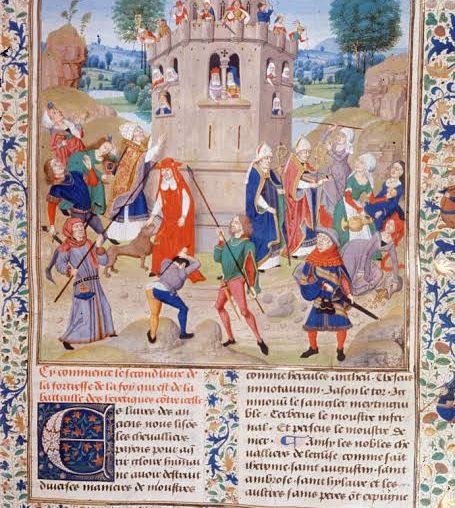Rebecca Forgasz was Director & CEO of the Jewish Museum of Australia for nearly ten years. This extract of her farewell lecture, Ten tantalising tales: stories from our collection, is part of a series published to mark the High Holidays. In each instalment Rebecca reflects on the personal, collective and cultural significance of objects and the collections that house them.
#2 Fortaletium Fidei
I walked past this object, mounted on the wall of our Timeline of Jewish History Gallery, for many years and never knew what it was.
Eventually, I was doing some research into items in our collection originating in Spain, and I discovered that this was an important manuscript called Fortaletium Fedei by the Spanish Franciscan monk, Alphonso de Spina. He was very learned and well-known as a preacher. Highly esteemed for his eloquence, he was also renowned for inflaming hatred of Jews, regularly making them the butt of attacks in his sermons.
In 1458, he wrote this manuscript, adding to it at different times up to 1485. It was printed frequently in subsequent decades. This 1475 edition is apparently very rare.
The Fortalitium Fidei is a treatise on various types of arguments to be used by preachers and others to oppose detractors of Catholicism. It is divided into five books: the first directed against those who deny the divinity of Jesus; the second against “heretics”; the third against the Jews; the fourth, against Muslims; the fifth gives instructions on the battle against the devil.
In the book about Judaism, de Spina collected all the accusations brought against the Jews – those of poisoning the wells, desecrating the host, and murdering Christian children for ritual purposes: whatever libels there were circulating around Europe about the Jews, he presented here as truth.
One of the most significant things about Alphonse de Spina is that he was the one who originated the idea of an Inquisition in Spain, targeting crypto-Jews—those who had converted to Christianity but secretly continued to practice Judaism.
“I believe,” said he, “that if a real Inquisition were introduced among us, countless numbers of them would be condemned to the stake; for countless numbers combine the adherence to Jewish customs with the observance of the Christian religion.” De Spina gained the ear of King Henry IV of Castile who was eventually succeeded by his half-sister Isabella, who did in fact establish an Inquisition in 1478.
De Spina also advocated for the explusion of Jews from Spain—which is mentioned on this very page that is displayed open in the Timeline gallery.
Once I learned what this object was, I found it very chilling to pass it as I walked through the gallery!


Comments are closed.